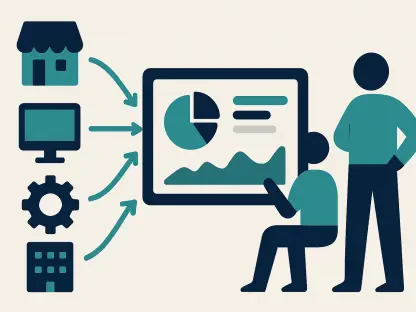In an era where digital threats evolve at an unprecedented pace, the complexity of cyber risk management poses significant challenges for global enterprises. Markel Insurance has strategically expanded its collaboration with Cyberwrite, a leader in cyber risk modeling, to address these challenges more effectively. This partnership aims to leverage AI-driven predictive analytics, enhancing underwriting capabilities and broker enablement throughout Europe. The integration of Cyberwrite’s technology is seen as a pivotal factor in achieving data-driven underwriting precision, drastically reducing loss ratios and operational costs in the cyber insurance sector. By utilizing Cyberwrite’s patented AI technology, underwriters and brokers are empowered to quantify the impacts and risks of cyber claims, providing a level of detail that was previously unattainable.
Transforming Cyber Risk Analytics
Enhanced Predictive Capabilities
Cyberwrite’s sophisticated technology is a game-changer for insurers struggling to interpret the complexities of cyber risk in a rapidly changing threat landscape. This platform converts intricate cyber risk data into actionable insights, facilitating swift communication of breach probabilities and impacts. By allowing seamless contextual benchmarking against industry peers, Cyberwrite enables insurers to integrate data into their catastrophe modeling solutions, a crucial advancement in predictive risk analytics. One of the most pressing challenges for insurers is the limited data available for cyber risk modeling. Cyberwrite’s platform mitigates this issue by offering real-time data collection on more than 99.97% of businesses worldwide, ensuring risk reports are available in multiple languages to serve a global clientele effectively.
The transformative nature of Cyberwrite’s platform is evident in how it aids insurance professionals in communicating complex cybersecurity scenarios with clarity. The detailed assessments provided include not only potential risks but also corrective measures and protection strategies for future contingencies. This capability is essential for the insurance sector as it adapts to a world where cyber threats are not only more frequent but also more sophisticated. The platform’s ability to deliver real-time insights into potential vulnerabilities ensures that organizations can proactively address issues rather than merely reacting to threats, thereby safeguarding their digital infrastructure.
Broader Implications for Underwriting
From Markel’s perspective, Cyberwrite’s platform fundamentally changes how cyber risks are evaluated across diverse markets, particularly for small- to mid-sized businesses. By accurately quantifying previously immeasurable factors, the platform simplifies the process of explaining cyber risks to clients, which is beneficial in guiding them toward suitable coverage options. This clarity not only aids in purchasing appropriate coverage but also plays a pivotal role in reducing breach risks. The real-time data collection, coupled with sophisticated modeling techniques, allows for bottom-up catastrophe modeling, enhancing the certainty of risk models and improving decision-making processes.
These benefits extend beyond improving underwriting precision to influence how brokers interact with clients and explain the complexities of cyber threats and insurance. As brokers better understand and quantify risks, they can offer more tailored recommendations, leading to higher client satisfaction and enhanced trust in the insurance process. This elevated level of service positions insurers like Markel as leaders in the industry by demonstrating a commitment to client education and proactive risk management.
The Future of Cyber Insurance
AI-Driven Methodologies in Cyber Insurance
The emergence of AI-driven technology in the cyber insurance realm marks a significant shift toward advanced analytics, crucial for accurate and efficient risk assessment. This partnership highlights an industry-wide acknowledgment of sophisticated data analytics as indispensable tools for underwriting and risk modeling processes. By embracing these technologies, insurance companies can achieve unprecedented levels of precision in risk assessment, leading to more accurate policy pricing and an overall reduction in loss ratios. The capacity of AI to analyze vast quantities of data in real time is a critical advantage in today’s data-centric world, enabling insurers to stay ahead of emerging threats.
This trend toward data-driven methodologies signifies the insurance sector’s adaptation to rapidly changing digital landscapes. It reflects a deeper understanding of the necessity for continual innovation and the incorporation of cutting-edge technologies. As AI continues to evolve, its applications in the cyber insurance space are expected to expand, further enhancing the capability of insurers to protect against potential fraud and breaches, thereby strengthening their market position and client trust.
Impacts on Operational Efficiency
The partnership between Markel and Cyberwrite also underscores operational efficiencies achieved through AI integration. By reducing the time needed for data analysis and underwriting processes, AI helps streamline operations, reducing costs and improving customer service timeliness. Insurers that adopt such advanced analytical tools can differentiate themselves in a competitive market, offering faster, more accurate services that meet the evolving demands of their clients. Moreover, the efficiency gained through AI-driven solutions can free up valuable resources, allowing teams to focus on strategic initiatives and innovation rather than being bogged down by manual data processing tasks.
Increasing operational efficiency through AI not only supports improved customer experiences but also enhances the internal processes of insurance firms. This alignment of technology with strategic goals fosters a more agile environment where businesses can rapidly adapt to new challenges and opportunities. As a result, the insurance industry stands at the cusp of a new era where technology-led growth becomes central to its success, paving the way for future innovations that will redefine the landscape of risk management.
Strategic Pathways for Cyber Insurance
Leveraging Comprehensive Data Analytics
The focus on comprehensive data analytics within Markel’s collaboration with Cyberwrite offers a glimpse into the future of cyber risk management. The partnership embraces a strategic vision where the integration of sophisticated data analytics and predictive modeling leads to smarter, more accurate underwriting. This forward-thinking approach responds to the increasing need for precision in risk assessment due to the growing complexity and frequency of cyber threats. Markel’s commitment to leveraging these technological advancements not only enhances their current capabilities but also positions them to address future challenges with greater adaptability and foresight.
Moreover, advanced data analytics empower insurers to implement proactive measures rather than merely reactive responses to cyber incidents. By predicting potential vulnerabilities and exposures, insurers can develop targeted strategies that mitigate risks before they manifest, thus protecting their clients and fortifying their own operational integrity. This proactive stance enhances the perceived value of cyber insurance, making it an essential cornerstone of risk management strategies for businesses navigating the intricacies of the digital age.
The Role of Innovation in Risk Assessment
Cyberwrite’s advanced technology revolutionizes how insurers interpret the intricate realm of cyber risk amid an ever-evolving threat landscape. This platform transforms complex cyber data into actionable insights that facilitate quick communication on breach probabilities and impacts. Through seamless benchmarking against industry peers, Cyberwrite allows insurers to incorporate data into catastrophe modeling solutions, which is vital for enhancing predictive risk analytics. A significant challenge for insurers is the scarce data for cyber risk modeling, but Cyberwrite alleviates this by collecting real-time data from over 99.97% of global businesses, providing risk reports in multiple languages for an international client base.
Cyberwrite’s platform proves transformative by aiding insurance experts in clearly conveying complex cybersecurity scenarios. It offers detailed assessments of potential risks and outlines corrective measures and protection strategies. This capability is critical for the insurance sector adapting to increasing and sophisticated cyber threats, enabling proactive vulnerability management to safeguard digital infrastructure effectively.









